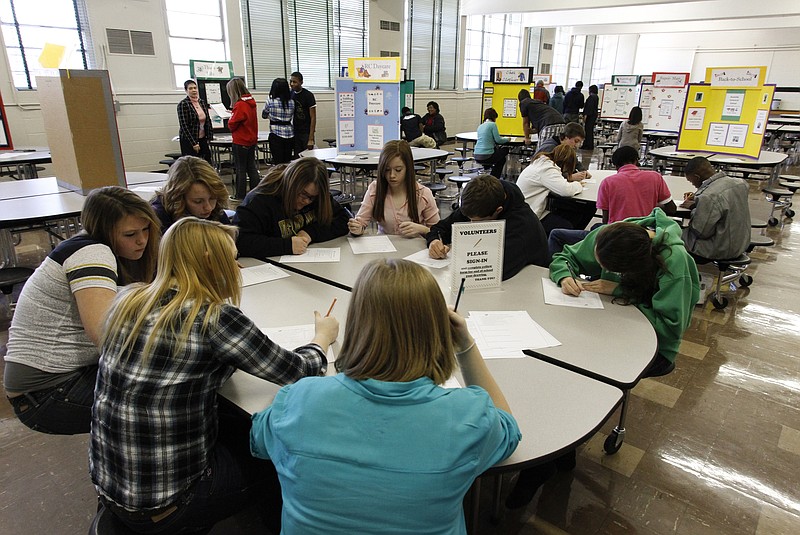A local nonprofit unveiled a new effort to reduce the stress children and teachers feel in the classroom.
The nonprofit Center for Mindful Living collected funds for Practices in Awareness and Understanding for Sustaining Educators on Wednesday night at its Catalyst fundraiser. Known as PAUSE, the professional development program will begin in the fall at some of Chattanooga's public schools to train teachers how to incorporate mindfulness in their classrooms.
The center, which opened in Chattanooga in 2012, started working in five schools this year and has trained students and teachers on mindfulness practices, which can look like breathing exercises and other ways of focusing the mind, according to Elizabeth Kabalka, the center's executive director.
"It's given my teachers tools on how to de-stress," said Vonetta Maston, principal at Hillcrest Elementary School. 'They are taking the time in the moment to relax. For the kids, it has given them the time to connect with themselves."
Maston said some of the most beneficial parts of the training have been discussions on trauma and how it affects the brain. Research shows that trauma experienced in childhood can have toxic effects on student achievement, and children living in concentrated poverty are more likely to experience trauma.
Witnessing increased needs in his student population led Apison Elementary Principal Ron Hughes to partner with Allyson DeYoung, principal at Middle Valley Elementary, to launch the Project Child initiative at their respective schools.
The project, funded by a $20,000 grant from the Community Foundation, has allowed the schools to create "mindful classrooms." Center for Mindful Living staff have been regularly visiting 10 classrooms at each school, teaching students and teachers mindfulness practices, as well as leading monthly professional development sessions with teachers.
"Teachers are entering the workforce without the skill set to deal with this," Hughes said. "The teachers can unitize these tools to balance their work lives, because the demands are great on teachers today."
In the fall, the center plans to launch PAUSE in three to four schools, hoping to train as many as 60 to 80 teachers on the 20-hour program. The program will include two components - professional education curriculum so teachers can increase their own self-awareness and self-regulation practices and in-school coaching sessions to help teachers implement strategies in their own classrooms.
"We are shifting from teaching the children to teaching the teachers," said Bob Berz of Berz Financial Partners, a sponsor of the center. "This is a more sustainable approach to instilling mindfulness in schools."
Mindfulness, along with yoga and meditation, has been gaining popularity in recent decades, and schools across the country are starting to take notice. It is considered one of the strategies to support social and emotional development, as well as to address discipline.
"Schools across the country are adding it to their curriculum," Kabalka said.
Hamilton County Schools Superintendent Bryan Johnson has even mentioned incorporating mindfulness practices in student support services, and center staff have recently met with Johnson.
"With PAUSE, we feel like we're about to hit two levers at the same time - we feel like we can really support teachers and give them tools to thrive and really reach children and have more of a long-term impact on them," Kabalka said.
Maston has seen the impact the practices can have.
"Discipline has decreased in the classes that have been trained," she said. "We can help [students] deal with the trauma they've experienced and hopefully change the trajectories of their lives."
Contact staff writer Meghan Mangrum at mmangrum@timesfreepress.com or 423-757-6592. Follow her on Twitter @memangrum.
